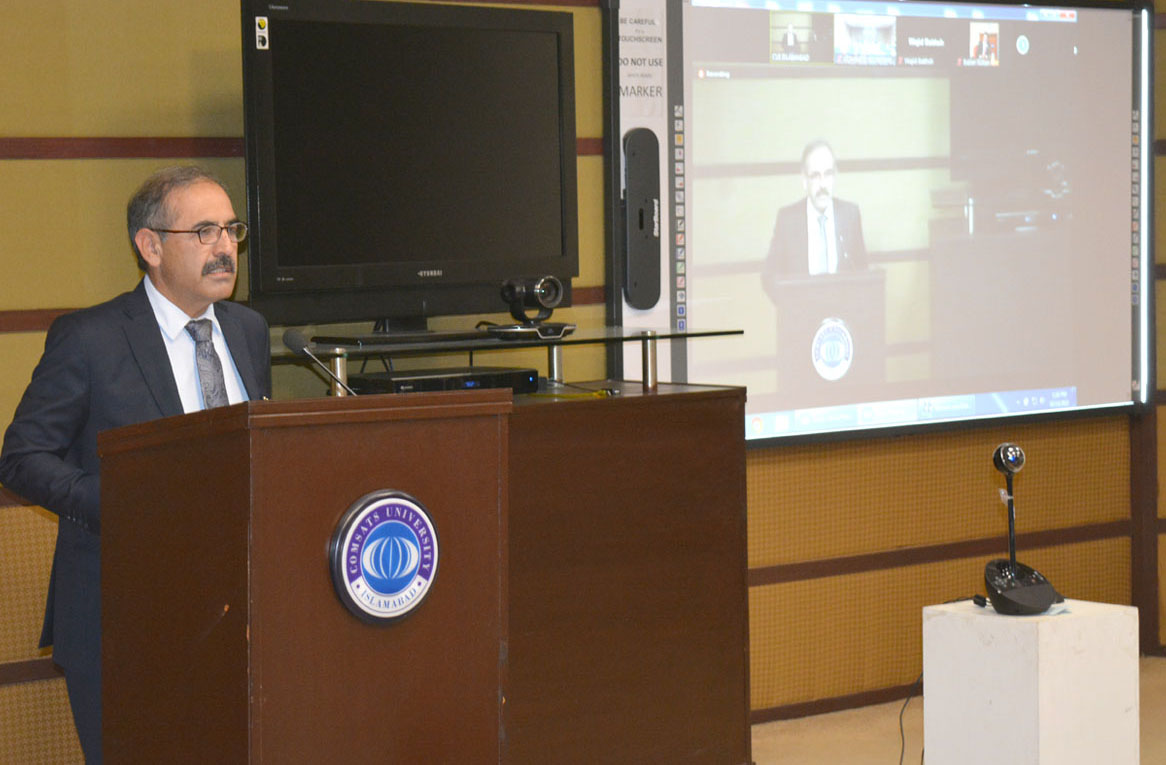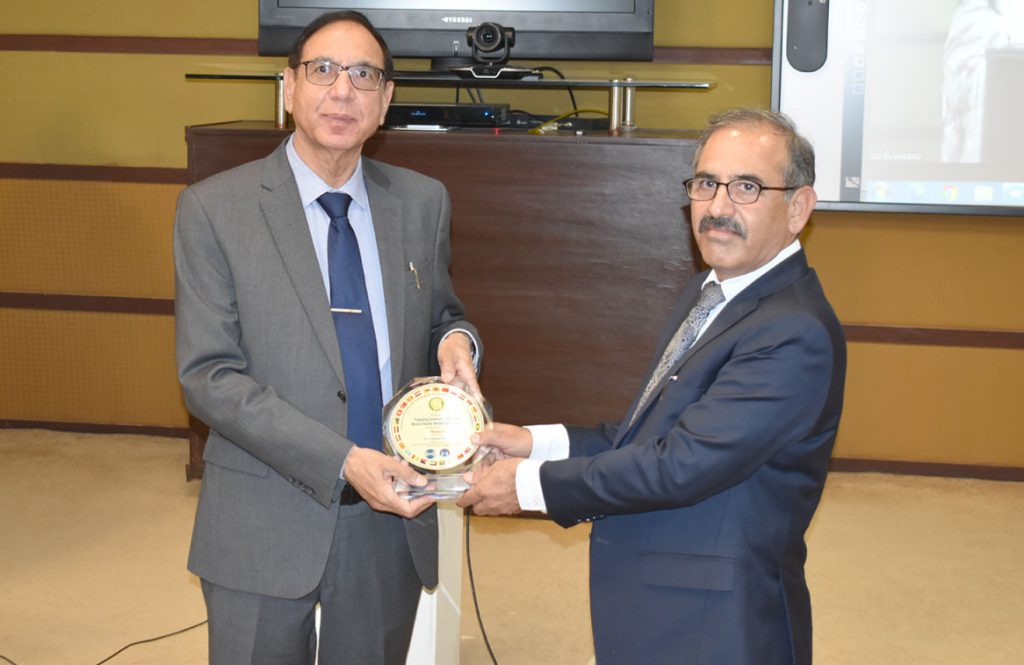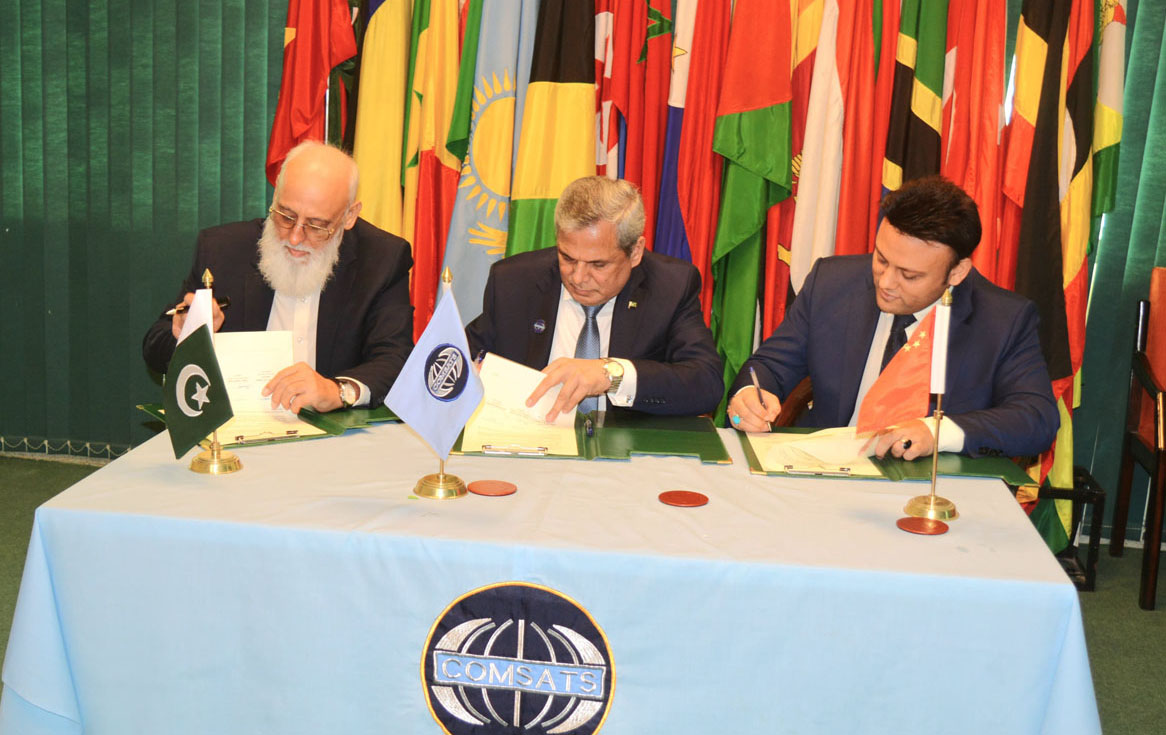COMSATS Secretariat and COMSATS University Islamabad join hands to observe World Mental Health Day with workshop on “Engaging University Faculty for Mental Health Wellbeing of Youth”
To observe this year’s World Mental Health Day, COMSATS in collaboration with its Centre of Excellence, COMSATS University Islamabad (CUI), Islamabad, organized a Workshop on “Engaging University Faculty for Mental Health Wellbeing of Youth”, on 14th October 2021. Held at CUI, Islamabad, the Workshop had physical and virtual participation of 30 faculty members belong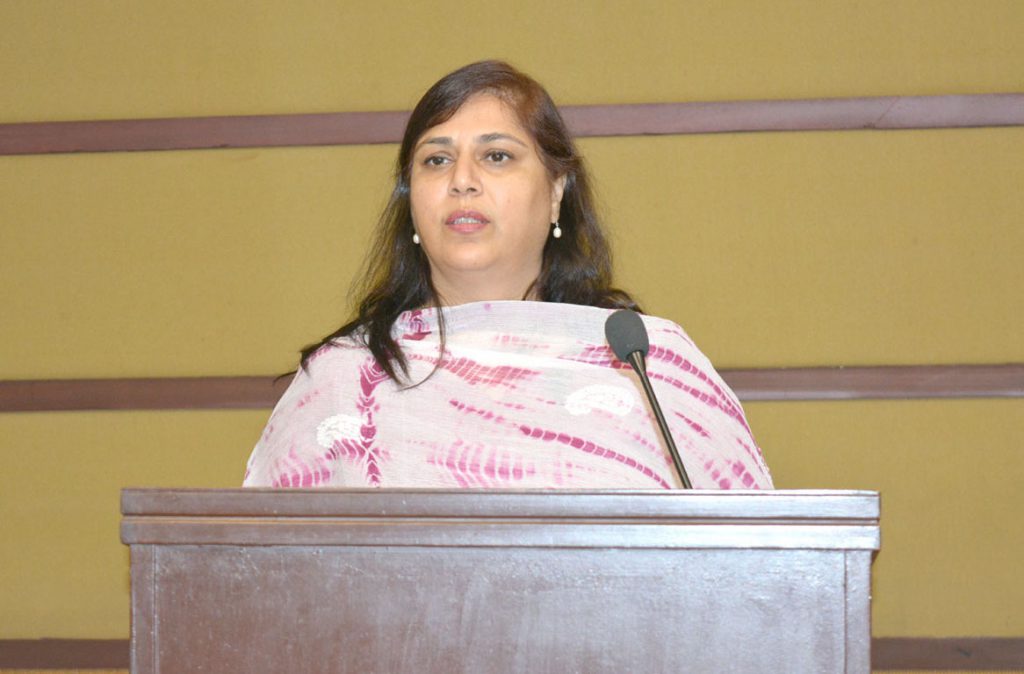 ing to various fields of arts and science. The subject event along with the overarching theme of mental health and wellbeing of youth also had the backdrop of Sustainable Development Goals 3 (Good Health and Wellbeing) and 4 (Quality Education).
ing to various fields of arts and science. The subject event along with the overarching theme of mental health and wellbeing of youth also had the backdrop of Sustainable Development Goals 3 (Good Health and Wellbeing) and 4 (Quality Education).
Opening the event, Dr. Azeema Fareed, Pr. Medical Officer and Focal Person COMSATS Telehealth Project, underscored the significance of the subject and need for creating awareness about it among people of all age groups. She also highlighted COMSATS’ efforts and contribution towards the realization of 2030 Global Agenda.
In his welcome address on the occasion, Registrar CUI, Dr. Sajjad A. Madani, highlighted a number of cha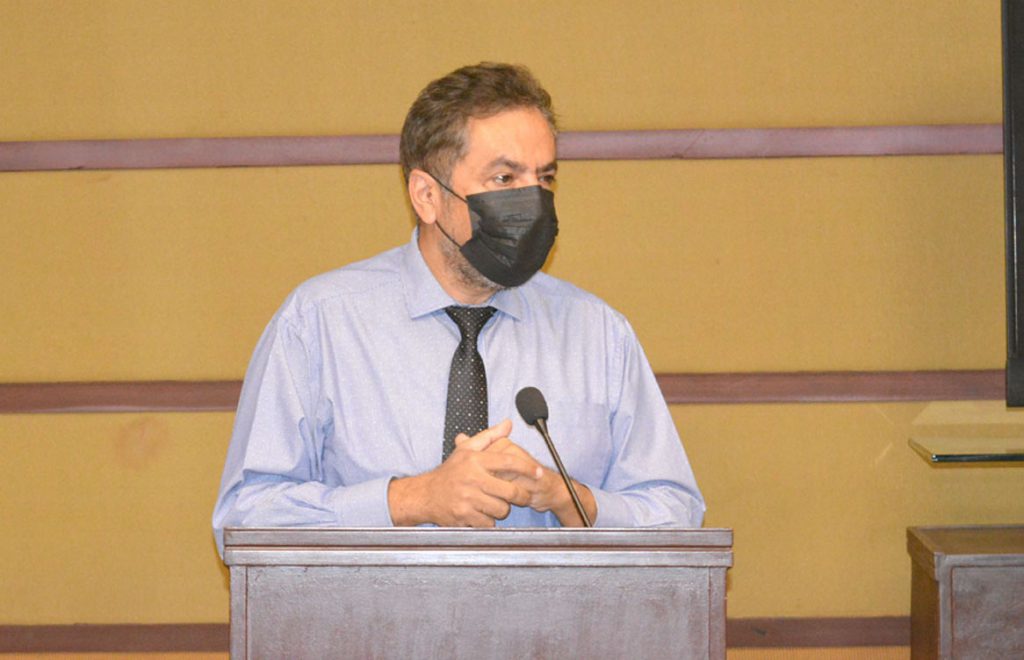 llenges for youth arising from the digital age. He especially mentioned the mental wellbeing challenges surfacing from the overuse of social media and is having deep social and psychological impact. He hoped that the current event will help identify and present remedial measures to combat such challenges.
llenges for youth arising from the digital age. He especially mentioned the mental wellbeing challenges surfacing from the overuse of social media and is having deep social and psychological impact. He hoped that the current event will help identify and present remedial measures to combat such challenges.
The first speaker for the technical session, Dr. Aisha Kashif, Counselor, Psychologist United Nations (UN), Islamabad, acquainted the participants with spectrum of the term “mental health” and briefly shared factors affecting mental health and peace. She shed light on the myths and stigmas associated with mentally sick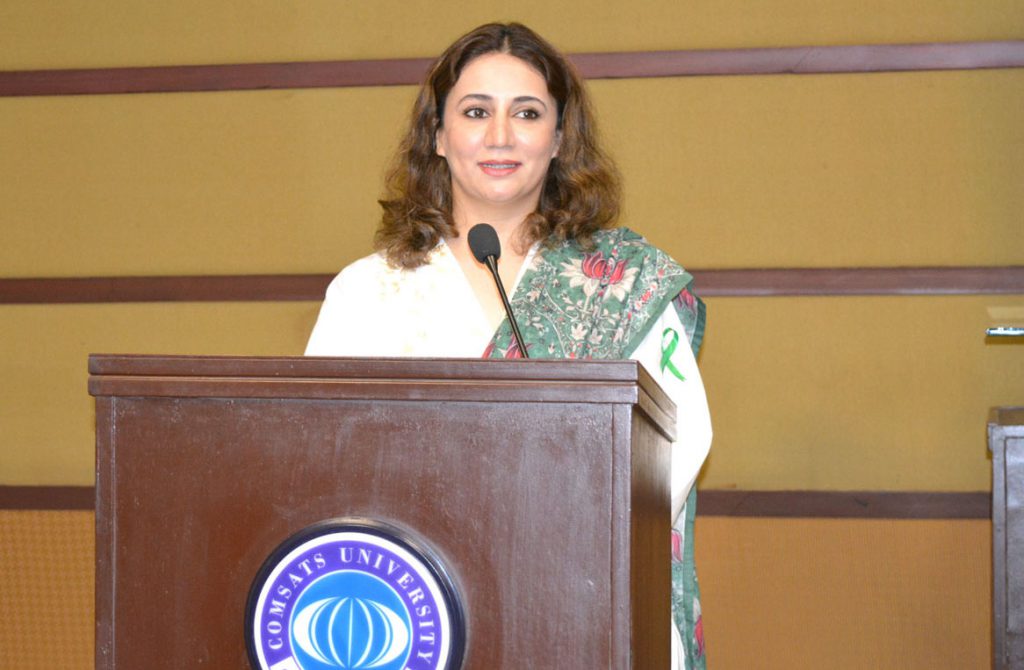 person and mental illnesses. She was of the view that the ability to manage day-to-day stress varies from an individual to individual. Discussing stress-related issues in university students, she stated that university environment presents a distinct set of challenges to students and could be a factor determining mental health of students. She was of the view that mental health is not a single-phase or constant state of mind but in actual is the ability to deal with day to day mental and emotional challenges in best possible manner to help keep negative energies and thoughts at bay.
person and mental illnesses. She was of the view that the ability to manage day-to-day stress varies from an individual to individual. Discussing stress-related issues in university students, she stated that university environment presents a distinct set of challenges to students and could be a factor determining mental health of students. She was of the view that mental health is not a single-phase or constant state of mind but in actual is the ability to deal with day to day mental and emotional challenges in best possible manner to help keep negative energies and thoughts at bay.
Dr. Noreen Akhter, Deputy Director Sr. Psychologist National University of Sciences & Technology (N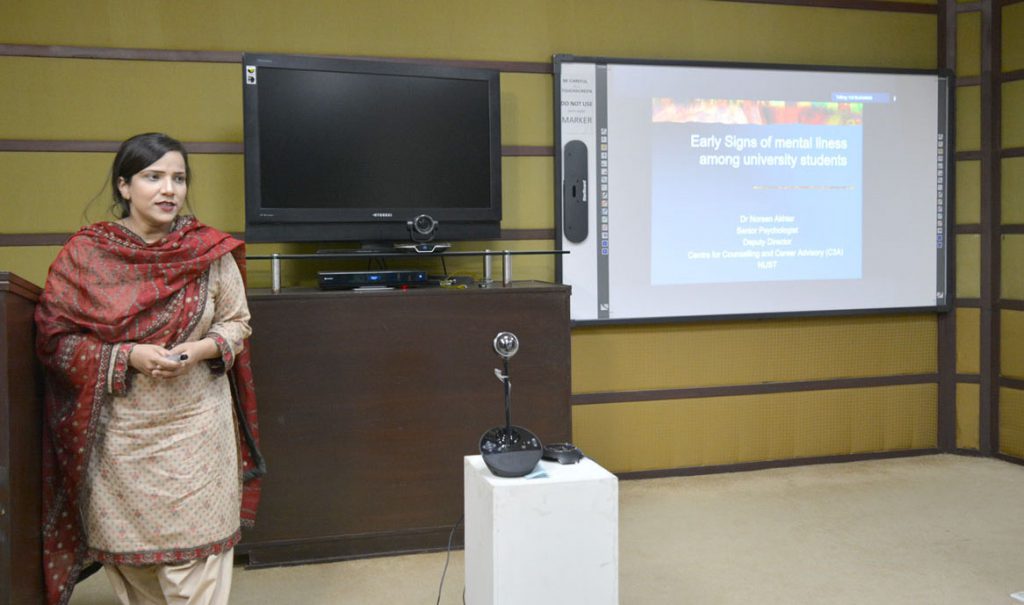 UST), Islamabad, focused on the warning signs and identification of at risk cases. She apprised the participants of the stigmas related to mental illnesses which may trigger self-harming behavior and suicidal thoughts in patients. Few factors affecting mental health and leading to increased cases of drug abuse, depression and anxiety in youth as identified by Dr. Akhter included: lack of connection between parents/teachers and youth and unhealthy use of social media and digital tools.
UST), Islamabad, focused on the warning signs and identification of at risk cases. She apprised the participants of the stigmas related to mental illnesses which may trigger self-harming behavior and suicidal thoughts in patients. Few factors affecting mental health and leading to increased cases of drug abuse, depression and anxiety in youth as identified by Dr. Akhter included: lack of connection between parents/teachers and youth and unhealthy use of social media and digital tools.
The last speaker, Dr. 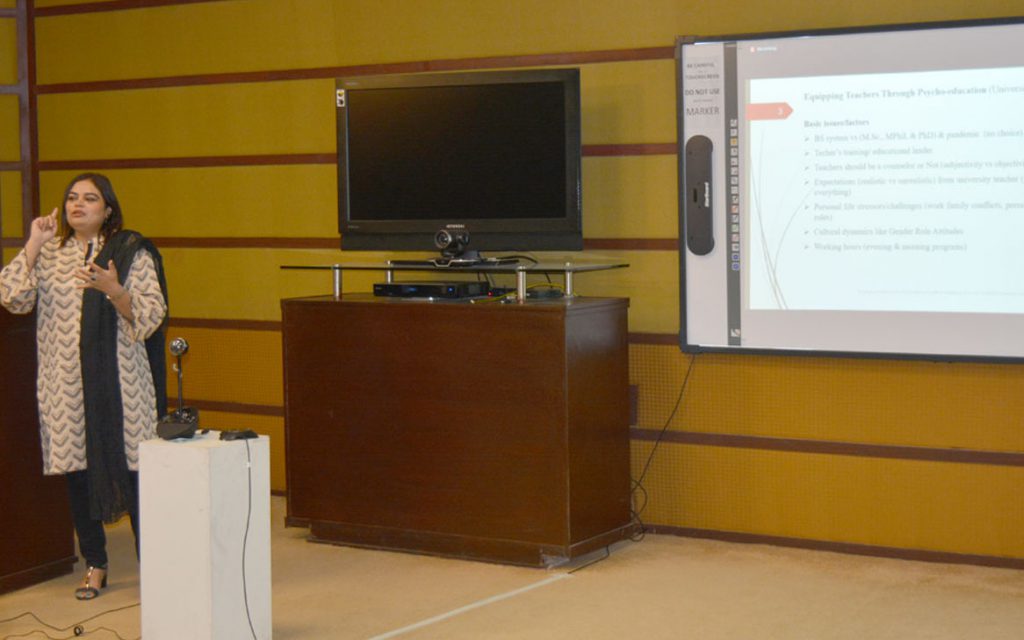 Saima Kalsoom, Psychologist, National Defence University (NDU), Islamabad, highlighted teachers’ role in contributing to students’ mental health and peace. In connection with this, she considered teachers’ psycho-education literacy vital and urged university policy makers to provide favorable environment to faculty for them to effectively manage their relationship with young minds. She suggested practicing mediation and yoga for a healthy mind and body and encouraged teaching faculty members to make good bonding with their students.
Saima Kalsoom, Psychologist, National Defence University (NDU), Islamabad, highlighted teachers’ role in contributing to students’ mental health and peace. In connection with this, she considered teachers’ psycho-education literacy vital and urged university policy makers to provide favorable environment to faculty for them to effectively manage their relationship with young minds. She suggested practicing mediation and yoga for a healthy mind and body and encouraged teaching faculty members to make good bonding with their students.
During the Q&A session, topics such as parents’ education, consequences of social media, and awareness on sexual harassment and other sensitive issues were deliberated upon. Discussing these issues, guest speakers added that lack of awareness regarding child mental health issues and absence of parent-child connection are root causes of increasing trend in mental illnesses in young generation. Moreover, moderate and effective use of social media and digital gadgets is vital to help deal with such challenges.
The Chief Guest for the event, Dr. Akhtar Nazir, incumbent Executive Director COMSATS, and Feder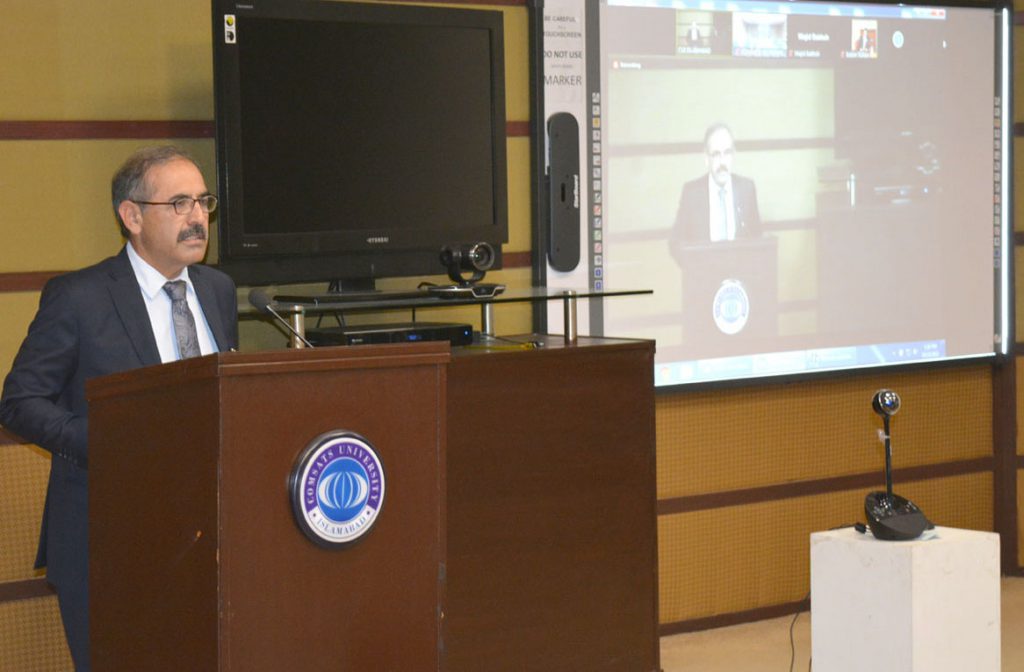 al Secretary, Ministry of Science and Technology, Government of Pakistan, appreciated the subject event organized by COMSATS Secretariat Telehealth Desk and COMSATS University Islamabad. In the light of key global stats on mental health of youth, Dr. Nazir considered it important to give this field of medical science due importance for ensuring healthier societies. He further emphasized the need for keeping debates open on this and other health issues through awareness events, which he deemed an important step forward for relevant remedial measures at societal and national levels. Moreover, he also shared his personal experiences and practices with participants to reduce stress and improve mental health.
al Secretary, Ministry of Science and Technology, Government of Pakistan, appreciated the subject event organized by COMSATS Secretariat Telehealth Desk and COMSATS University Islamabad. In the light of key global stats on mental health of youth, Dr. Nazir considered it important to give this field of medical science due importance for ensuring healthier societies. He further emphasized the need for keeping debates open on this and other health issues through awareness events, which he deemed an important step forward for relevant remedial measures at societal and national levels. Moreover, he also shared his personal experiences and practices with participants to reduce stress and improve mental health.
Delivering his vote of tha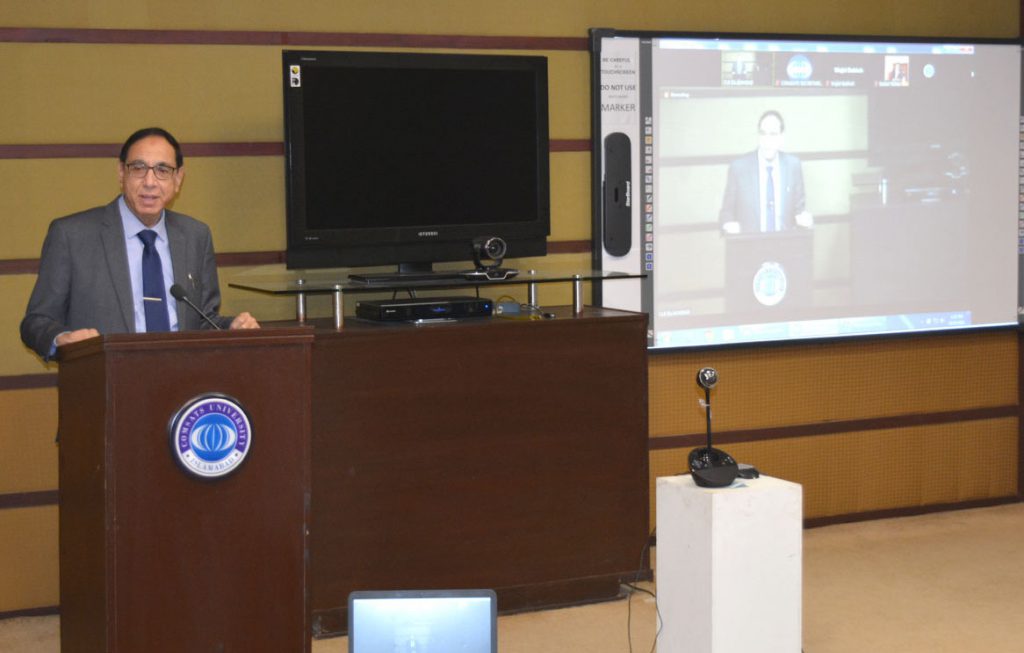 nks at the closing ceremony, Prof. Dr. Tabassum Afzal, Rector COMSATS University Islamabad (CUI), considered the subject very timely owing to increased stress and other mental health related issues since the onset of COVID-19. Considering cultural and societal norms an important factor in dealing with mental illnesses, Prof. Afzal cited examples of stress management from the Islamic history and urged the faculty to take initiatives for the wellbeing of youth’s mental health. He also acknowledged the long-standing COMSATS – CUI relationship and extended gratitude to organizers, participants, and other distinguished guests.
nks at the closing ceremony, Prof. Dr. Tabassum Afzal, Rector COMSATS University Islamabad (CUI), considered the subject very timely owing to increased stress and other mental health related issues since the onset of COVID-19. Considering cultural and societal norms an important factor in dealing with mental illnesses, Prof. Afzal cited examples of stress management from the Islamic history and urged the faculty to take initiatives for the wellbeing of youth’s mental health. He also acknowledged the long-standing COMSATS – CUI relationship and extended gratitude to organizers, participants, and other distinguished guests.
The event concluded with the distribution of certificates among the participants and presentation of shield to the Chief Guest.

